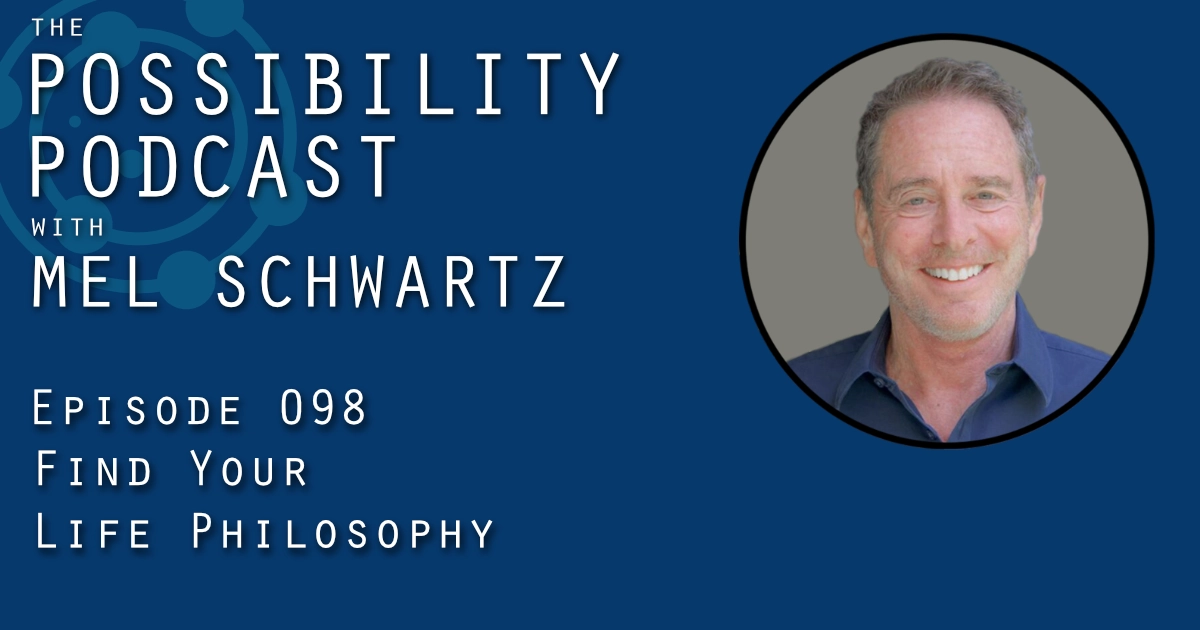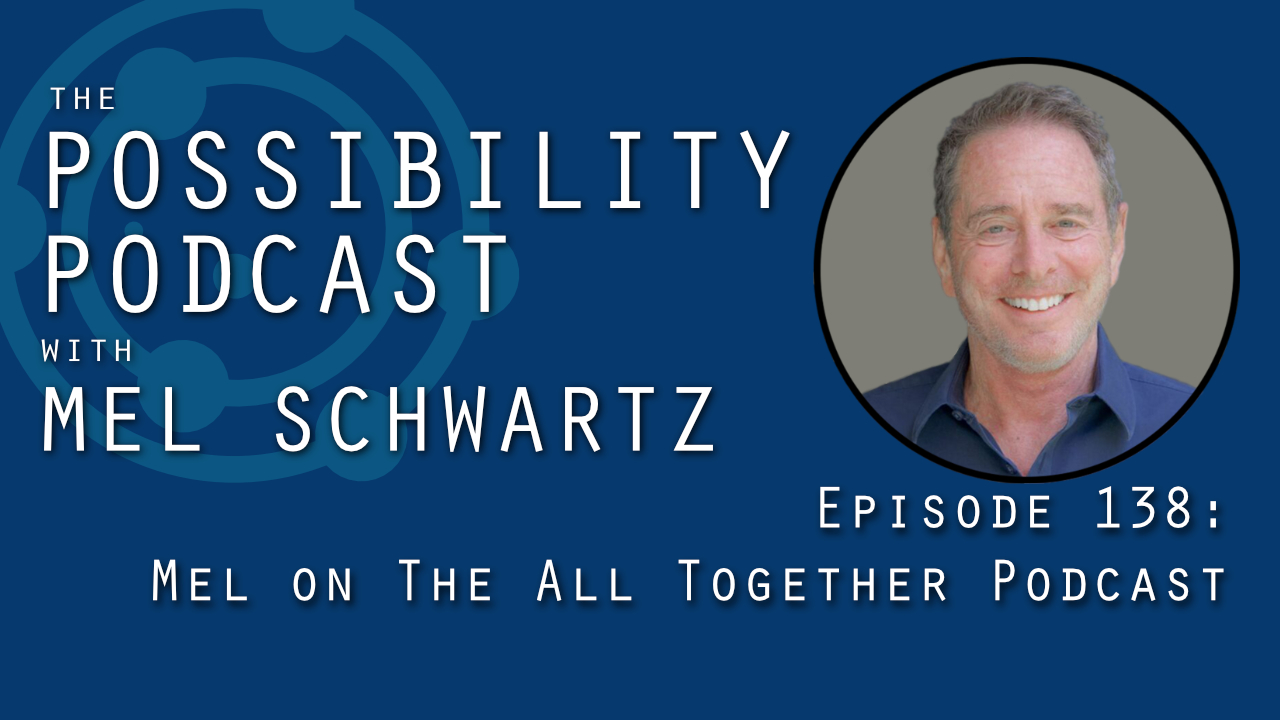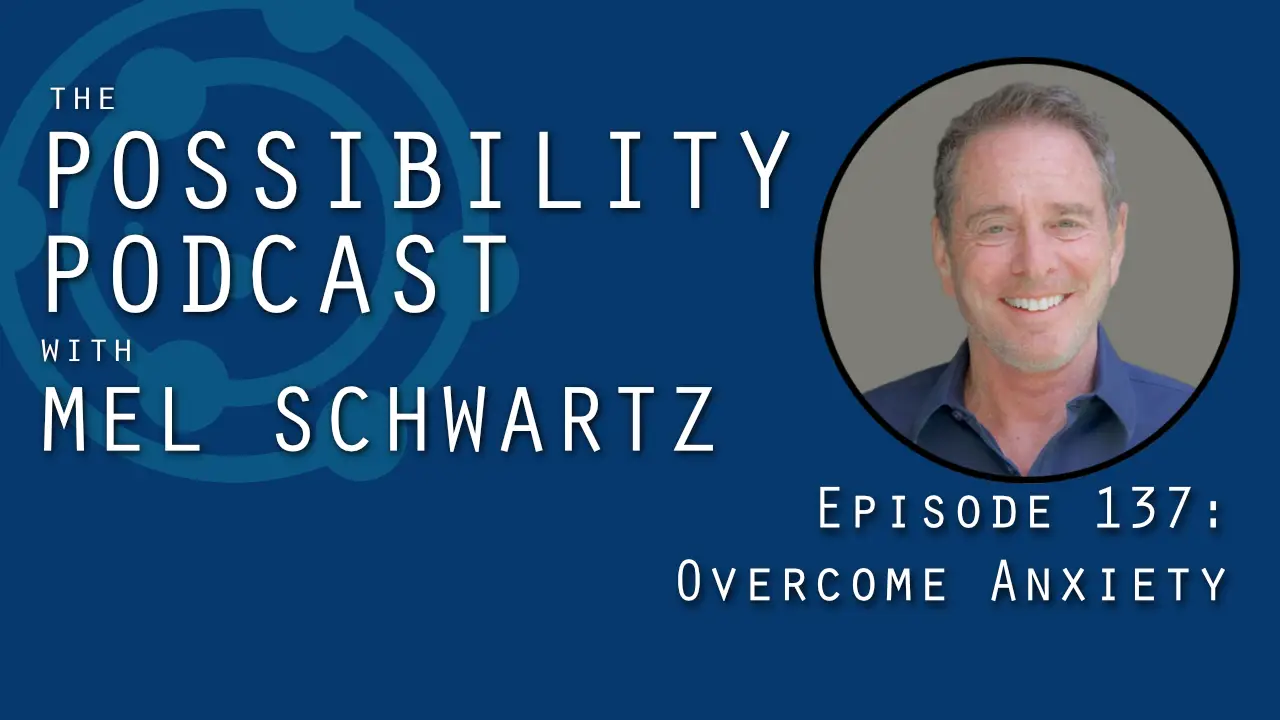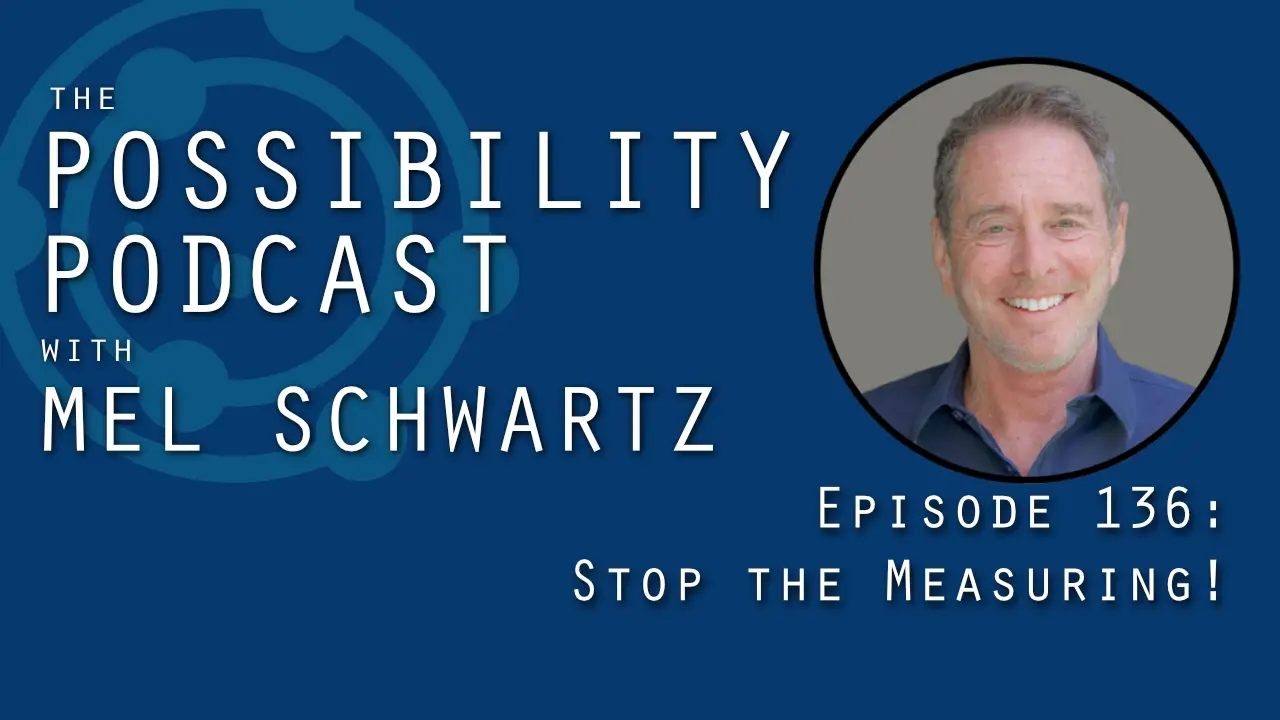Podcast: Play in new window | Download
It’s never too late to find and develop your personal life philosophy.
Listen to this 98th episode of The Possibility Podcast with Mel Schwartz to learn how you can reduce anxiety and enhance your focus, sense of purpose, and happiness when you find your life philosophy.
Interested in bespoke marriage and relationship counseling from Mel Schwartz? Reach out!
I’d love your feedback on this episode. Be sure to leave a comment!
Subscribe to The Possibility Podcast with Mel Schwartz
Don’t miss a single Possibility Podcast with Mel Schwartz! Subscribe for free in iTunes / Apple Podcasts, YouTube, Spotify, RadioPublic, Spreaker, or wherever you listen to podcasts. Or, simply copy / paste the RSS link directly into the podcast app of your choice!
Please Rate and Review
If you enjoy The Possibility Podcast with Mel Schwartz, please take a moment to rate and review the show in iTunes / Apple Podcasts or Podchaser. It only takes a few minutes, and adding your review is as easy as clicking this link.
Your rating and review helps raise the visibility of The Possibility Podcast with Mel Schwartz, especially on iTunes / Apple Podcasts, which is one of the biggest podcasting platforms today. More visibility for the show means more listeners… and that growth means the show reaches — and helps — more people like you.
Thank you!
Talk With Mel!
Help others when Mel helps you: Contact Mel and find out how you can be a caller on the show and ask Mel a question. He’ll put the Possibility Principle to work for you, and your conversation will be recorded for use in a future episode of the podcast so other listeners can benefit.
Transcript of The Possibility Podcast with Mel Schwartz #098
Hello everybody and welcome to The Possibility Podcast. I’m your host, Mel Schwartz. I practice psychotherapy, marriage counseling, and I am the author of the book, The Possibility Principle, the companion to this podcast. I hope to be your thought provocateur and I’ll be introducing you to new ways of thinking and a new game plan for life.
Hi everybody. I’m going to explore some basic fundamental issues with you today, which we don’t really get to address in life, but arguably nothing could be bigger. And it’s about developing a philosophy for how we want to live our lives, what our life should look like. And by the way, this philosophy for life, it doesn’t pertain to what we need to do when we are teenagers or young adults. It can happen anytime in life. And I don’t know if it’s good or bad, but arguably it doesn’t usually happen until midlife. It would be better if we explored this early in life. If it were part of our education to think through and develop a philosophy for life, just like before you start a business, you develop a business plan.
So what do I mean by a philosophy for life? How do I choose to live my life? What is going to be important to me? What do I value? And of course I can edit that and change it as life goes along. But how do I want to navigate life? Most of us never really think of that. We’re on a conveyor belt in which we go through school and arguably through college and get a first job and pursue a career path and a romantic relationship and marriage and children and a few homes. But life just happens to us.
Take a step back and ask yourself, what do I value in life? What principles do I want to guide me? Many people may say they value friendship, love, intimacy. These are principles that we adhere to and value, but they become marginalized in life often. There are always exceptions, but many people don’t follow the principles they say they want to value.
A philosophy for life is what has meaning to me? How do I want to pursue my life? What does that look like? And I guess these principles depend upon what you believe, what you were taught to believe, arguably the family you came from. You want to live a life like that or perhaps the opposite of that, but what matters to you?
So, for too many of us, what matters to us are important things, but they’re not the guiding light for life. Everyone says they want to be happy, but do we pursue happiness? Do we pursue our authentic self or do we get stuck in the pursuit of wealth, attainment? We want to live long and be healthy, but do we live a life that is committed to our health, our emotional health, our physical health, our psychological health, and the health of our relationships?
So unfortunately, no matter how we start out in life, we tend to be on survival mode or acquisition mode, but are we truly thriving? We’re human beings, but we are in the process of becoming in our lives, but becoming what? Think of yourself as a soul. Now you want to tend to your soul. When I say soul, I don’t necessarily mean religious. I’m speaking more spiritually. A soul, an inner being, what does your soul long for in your life? How do you nurture your soul? How do you become attuned to your soul and the souls of people that you love and care about?
Sadly, we become so individualistic in our lives and that isolates us. So we stop communing with each other and frankly, for most of us, we never got to commune with
ourselves.
I’d love to show you my appreciation for your subscribing to and rating this podcast by offering you a gift to one of the following the power of mind, a live talk that I gave or one of my digital ebooks, creating authentic self-esteem, overcoming anxiety or raising resilient children, and lastly, cultivating resilient relationships. Once you have subscribed, please send an email to Mel at MelSchwartz.com and just let me know which gift you’d prefer. Thanks.
But coming back to a philosophy for life, there is one staggering thing I experienced both as a lay person and as a therapist. What we call death awaits all of us.
And yet with few exceptions, we don’t talk with each other about death. What does death mean to you? What does it mean to me? When we don’t talk about it and at least resolve our beliefs, we live in fear. Can you imagine how the fear of death, which we keep to ourselves for the most part and don’t discuss, how that fear of death impacts our lives?
If you live your life with a fear of death, then you live your life in anxiety. The greatest source of anxiety is this existential dilemma about, I’m going to die. When I’m working with young adults or teenagers, I might at times ask them a question. What do you think about death? They shrug their shoulders. I don’t know. Did your parents ever talk to you about it? Nope. What do you think happens? Have no idea. How can we live well unless we begin to contemplate and come to an understanding for ourselves about what death means?
When I was a kid, cancer was a bad word. It was a scary word. So people actually used to say the C word referring to cancer. I guess the fatality rate for cancer was much greater then and it might have looked like a death sentence. So we avoided talking about it. We do the same thing with death. You may have heard me speak quite some time ago in a different episode about my sitting down to lunch with two dear old friends. And I thought, I don’t want to have the same old conversations. We’re all getting on in years. So I asked them, do you guys think about death? What does it mean to you? Does it bring up fear? What are your beliefs? One of them was most uncomfortable with the conversation. The other one was willing to have it. We just don’t talk about it because we’re scared about it. How is that possibly going to work out?
Remember, fear of death creates profound anxiety. Now you may not come to an answer about this, but don’t you owe it to yourself to explore. I was doing some therapy with a religious organization some years ago. The heads of the organization came to work with me. They were having conflict issues. They were discussing the loss of one of their congregants and how hard it was to deal with and the talk that they were going to give to the family and the congregation. I asked the head rabbi, well, what are your spiritual beliefs? What does death mean to you? He looked at me blankly. I was incredulous. The head rabbi of the synagogue hadn’t thought about or come to his own beliefs about death.
At the very least, read, listen, talk to others, come to your own beliefs. We have traditional religion, Judeo-Christian religion, which teaches us A, about death. We have those who are not religious who may also believe in A or B. Here, what do I mean by this? Well, heaven or hell or my body turns to ashes and dust and that’s the end of me. But does that mean you don’t have a soul? What do you think about soul? What is primary? Do you believe that matter is primary in life or is consciousness primary? The answer to that question will lead you down a pathway toward what you may ultimately believe.
Sometimes people will ask me, well, Mel, what do you believe? Well, I’ll share my belief with you, but not for the purpose of convincing you, but for the purpose of demonstrating what it’s like to reveal our beliefs. I believe that consciousness is primary. Matter is just a manifestation of consciousness and consciousness is universal. We have individual consciousness, which is part of universal consciousness. I do not believe that consciousness or energy can die. I’m fond of saying, look at Einstein’s famous formula of E equals MC squared. It tells us that energy and matter cannot be destroyed. They can only convert from energy to matter and matter to energy. And in that, I saw a model for what we call life-death, which is life. We are matter, we are physical. What we call death is a conversion to energy.
But my goal here is not to convince you. It’s to start to get you stimulated to look at these questions for yourself. You may not be able to resolve what death means, but if we all start to open up and at least talk to each other, it will help to reduce some of this unconscious anxiety, which just is so debilitating in our lives. And younger people in particular have such a hard time developing a sense of meaning and purpose in life because their attitude is you live and then you die.
So what’s the whole purpose? What could be more important? So coming back to where I began today, you want to develop a philosophy for life at any age in your life. Obviously as we get older, we’re more inclined and open to start to get philosophical, look at life and say, you know, I’ve attained all my goals, but I’m still wanting for something. What is that that I’m wanting for? It’s not more success. It’s not more recognition. Maybe it’s peace, harmony. What philosophy for life do I need to engage, to earn the rewards of harmony, tranquility, meaning and purpose?
So pause, don’t get caught up in the hectic quality of your life and day in and day out because in two blinks of an eye, you’ll be nearing the end. Choose what is my philosophy for life? And if you don’t have the answer, open up to the realm of great philosophy available to us.
I’ve only discovered this actually recently in my life, philosophy, a lost wisdom philosophy in the breakneck pace of our lives. Philosophy doesn’t hold the right value, but maybe that’s the anchor because that can provide us with wisdom, which philosophy you choose, but explore them. There are lots of great podcasts on philosophy, lots of great books. If you want any suggestions, get in touch with me.
Now my next couple of episodes or perhaps quite a few episodes are going to be devoted to love, intimacy and relationships because I’ve come to see and believe that is the common denominator. Please get in touch if you have any questions or would like some guidance and being able to ferret out the right philosophy for you to have for the rest of your life and to explore again what we mean by death.
Until next time, wishing you a meaningful and purposeful life. And I hope you’re on the path of finding the right philosophy for life for you. Be well.
I hope you enjoyed this episode of The Possibility Podcast. I welcome your feedback on this and any episode. Please send me an email at mel at melschwartz.com or leave a comment in the show notes for this episode at melschwartz.com. If you like what you’re hearing, please take a moment to rate and review the show at Apple podcast, Spotify, or wherever you get your podcasts. Your reviews really help boost the visibility for the show. And it’s a great way for you to show your support. Finally, please make sure to subscribe to The Possibility Podcast wherever you listen to podcasts. And that way you’ll never miss an episode. Thanks again, and please remember to always welcome uncertainty into your life and embrace new possibilities.




